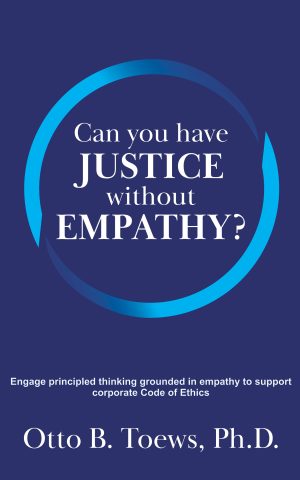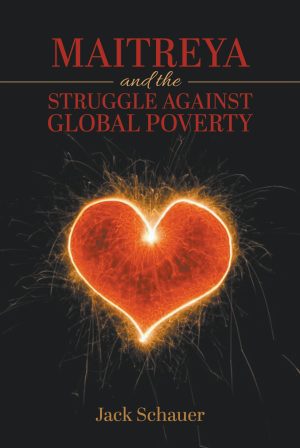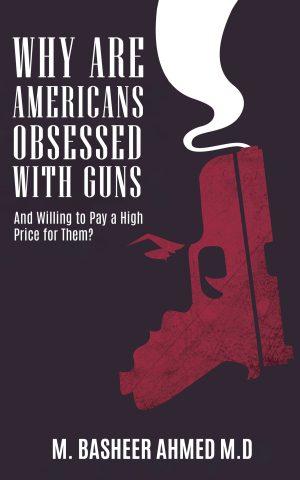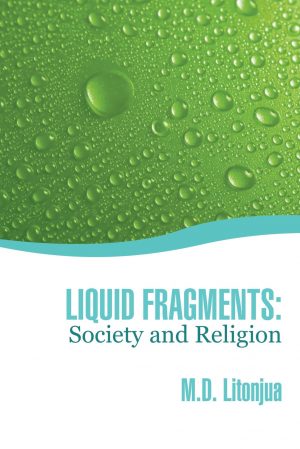Social Science
Showing all 5 results
-

Can You Have Justice without Empathy?
Engage principled thinking grounded in empathy to support a corporate Code of Ethics

Otto B. Toews, Ph.D.
About the Book
When I conducted an informal survey of middle to old-age folks representing a range of professionals and tradespeople on the question, Can you have justice without empathy? most answered, “NO! You cannot have justice without empathy.” A few said, “I don’t know.”
How might CEOs answer this question? Does it matter? My informal survey suggests that the public would say YES, it does matter.
CAN YOU HAVE JUSTICE WITHOUT EMPATHY? outlines how empathy can and must serve as a foundation for exercising principled thinking to resolve conflicts in pursuit of justice. Both emotional intelligence (empathy) and cognitive intelligence (principled thinking) are needed to resolve conflicts.
This book is written for students in business colleges and corporate management teams to enhance their ability to make just and fair decisions. Hypothetical conflict scenarios and conversation challenge users to work through conflicts that arise in companies.
About the Author
Dr. Otto Toews had a primary commitment to education throughout his career, though it took different forms from classroom teacher, principal, assistant superintendent, and teaching university graduate students. This was followed by the development of educational software with Apple, courseware for Microsoft, and the development of a website on grammar and writing resources for students in remote villages in Malaysia and China.
In his Ph. D., he developed a framework for exercising discretion to pursue justice in administration which became the framework for his book, SO YOU THINK YOU CAN THINK?
His wife, Joan McCreath, was actively engaged in many of his initiatives including the focus on empathy in this book.
-

So You Think You Can Think?
Thinking through moral dilemmas in pursuit of justice

Otto Toews, Ph.D.
About the Book
In our complex world, how can we learn to think through moral dilemmas in the pursuit of justice? How do the words we associate with morality impact our understanding and application of it? In short, how can we enact equal measures of fairness among family members, friends, and strangers? These are the troubling questions that guide Dr. Otto Toews as he critically engages with the language of morality and uncovers what is lacking in our conversations about fairness. Using a Principled Thinking Model for resolving everyday moral dilemmas, Toews identifies five basic categories that are necessary for moral thinking: duty, rights, motive, desert, and justice. Combining this research with Nel Nodding’s seminal work on caring, Toews concludes that while it is vital that we practice thinking through moral dilemmas, the key to attaining universal justice and fairness lies in our sense of fellow feeling, or empathy. Toews argues that without the urgency and energy prompted by a sense of concern for others, thinking through moral dilemmas will remain insufficient in fostering an ethical world.Throughout the book, Toews augments his research by providing hypothetical scenarios involving two teachers, Bill and Mae. They engage in spirited debates over how duty, rights, motive, desert, and justice apply to issues such as education, cyber bullying, mental illness, reconciliation, and more. Again and again, Bill and Mae are caught up by the power of empathy, demonstrating the urgent need to care for others. It is through their dialogues that Toews has designed a brilliant way for us to witness moral thinking in action, giving us the language we need to navigate it, and preparing us for the countless types of conflicts we encounter every day.
About the Author
Dr. Otto Toews is a former teacher, school administrator, curriculum assistant superintendent, university lecturer, software developer, and digital courseware developer. Much of his work has centered on his longstanding fascination with the nature of language and morality. During his graduate studies—as well as through many practical experiences—he developed a Principled Thinking Model, which offers a way for people to resolve moral dilemmas through language and reflection. In collaboration with Apple Canada, he applied his keen interest in the use of technology for teaching and learning. He also partnered with Microsoft to create user-friendly digital learning resources aimed at teaching students “to think as you write, and write as you think.” In 1999, he received the Dr. John M. Brown Award for his outstanding contribution to teacher education in Manitoba. He has published his thinking and writing strategies on his website, www.sponsoravillage.ca, which has received over three million hits to date. He currently resides in Vancouver, with his wife, Joan McCreath. They both enjoy reading, writing, and engaging in non-profit organizations that address the needs of the less fortunate.[email protected]
-

Maitreya and the Struggle Against Global Poverty

Jack Schauer
About the Book
“Maitreya and the Struggle Against Global Poverty” is primarily a qualitative study of global poverty as viewed within the philosophical, political, economic, and social perspectives from the perspectives of Maitreya and the social justice platform of the Roman Catholic Church, as well as perspectives from a business and international relations standpoint. This in-depth study explores such beliefs as a Global Marshall Plan as well as the purpose and perspectives (liberal and conservative) on how the MNC (multinational corporation) deals with such concepts as corporate social responsibility as well as the millennium goals of the United Nations, an in-depth look at the problems of global poverty vis-à-vis the perspectives of specific countries in Africa. The book also address global measurements of poverty, the progress made by social business, an analysis of capitalist versus democratic socialist economies, and the implications of this analysis vis-à-vis global poverty. An international code of ethics is also addressed.About the Author
Jack Schauer is an author and singer-songwriter from Fargo, North Dakota. He has recorded and produced four CDs. He graduated from the University of Jamestown, Jamestown, North Dakota in December of 1980. He has two Master’s degrees: one in Liberal Arts, Moorhead State University, Moorhead Minnesota and Nonprofit Management; Capella University, Minnespolis, Minnesota. He has done doctoral work in Business Administration and International Relations at Argosy University, Sarasota Florida. His interests, in addition to philosophy, history, politics and issues of social justice and welfare, focus on the teachings of the World Teacher Maitreya and how that teaching translates in terms of world poverty and global sharing of resources, from an interdisciplinary and multidisciplinary set of perspectives. -

Why Are Americans Obsessed with Guns And Willing to Pay A High Price for Them?

M. Basheer Ahmed M.D.
About the Book
As a psychiatrist, Dr. M. Basheer Ahmed has seen firsthand the ghastly toll gun violence that has taken physically and emotionally on patients, as well as on the communities. This is what prompted him to write this booklet.About the Author
Dr. Basheer Ahmed is a retired psychiatrist and a social activist He was born in Hyderabad, India. He completed his undergraduate studies in India, Pakistan, and post graduate studies in Psychiatry in United Kingdom. He immigrated to the United States, where he enjoyed a long career as a psychiatrist, professor, medical director, public speaker, and author of books and articles on mental health issues and Islamic culture. After retiring from private practice, Dr. Ahmed has devoted his time to social service activities and interfaith understanding. He founded three organizations: Muslim community center for Human services, providing health and social services to indigent residents of Dallas-Fort Worth area, IQRA for peace an organization promoting Intra-Faith sectarian harmony and Institute of Medieval and post Medieval studies disseminating information about Muslim contribution to world civilization and inspiring young students to become scientists, As a psychiatrist, he has seen firsthand the ghastly toll gun violence, has taken physically and emotionally on patients as well as on the communities. This is what prompted him to write this booklet. He lives in Plano, Texas, with his wife, Shakila, a retired radiologist, and is the father of two practicing attorneys, his son Sameer and daughter Araj. -

Liquid Fragments: Society and Religion

M.D. Litonjua
About the Book
Zygmunt Bauman, perhaps the foremost interpreter of our times, prefers the term “liquid modernity” to postmodernism or late modernity to designate the historical period we are going through. It is a time of constant change and relentless transformations, turning everything into a shapeless mass, overturning established understandings of self, society, and practically everything else. The old solidities of sex and gender, marriage and family, news and mass media, economy and politics, for example, have liquefied and no longer provide stability. The metaphor of liquidity perfectly captures the essence of the world we live in: rapidity, permeability, and mutability. This is what sociology is now charged to do: to put humanity in a position to know, to understand, and therefore to choose. “Just as no one in the twentieth century could go on doing sociology without reading Karl Marx, so no one in the twenty-first century can go on doing sociology without reading Bauman.” This is also true for theology. Pope Francis has said that beauty, hope, and diversity in a globalized world are possible, even in times of “a liquid society.” Thus, liquid modernity becomes the context for theologizing, evangelizing, missionary work, and service to the poor. Pope Francis of the Church as a “field hospital” finds Bauman’s ideas congenial, his attention to lived experience, his inherently moral metaphors. Bauman’s is a sociology of hope. Bauman, for his part, has described Pope Francis as “the most precious gift offered by the Catholic Church to our world.” Both give voice to the voiceless; both recall to us our inescapable human and moral responsibility for the Other; both address the plight of those cast away from society, those who have been marginalized, forgotten, and ultimately “wiped out.” Liquid modernity makes our lives fragmented. But theologian David Tracy offers a positive take on fragments. It is a way to break totalities, to fragment all total systems and open them to infinity. Totality closes. It won’t allow the openness and the dynamism that are demanded of any great tradition. It tries to close it. All our traditions are in fragments. We choose particular fragments that we think are particularly valuable right now, that are relevant to the times. Besides, it is not really possible to do the entire tradition. It would take several lifetimes to do the whole tradition. The ideal is of course the whole, but the whole not as a totality but as infinite, dynamic, open Thus, the title, Liquid Fragments, of my seventh collection of articles. It shares the same epistemic standpoints: the human dignity of all, the option for the poor, solidarity for the common good, and care for the earth, our home.About the Author
“M. D. Litonjua is emeritus professor of sociology at the Mount St. Joseph University in Cincinnati, OH. He holds a Ph.D. in Sociology from Brown University, an M.B.A. from the University of Missouri-St. Louis, and Licentiates in Philosophy and Theology from the University of Santo Tomas (Manila).”
[email protected]
20-22 Wenlock Road, London N1 7GU +44-20-3656-5431
6065 Roswell Road, #450 Atlanta, GA 30328-4011 +1 855 515 1361
Payments made through this site are secure.